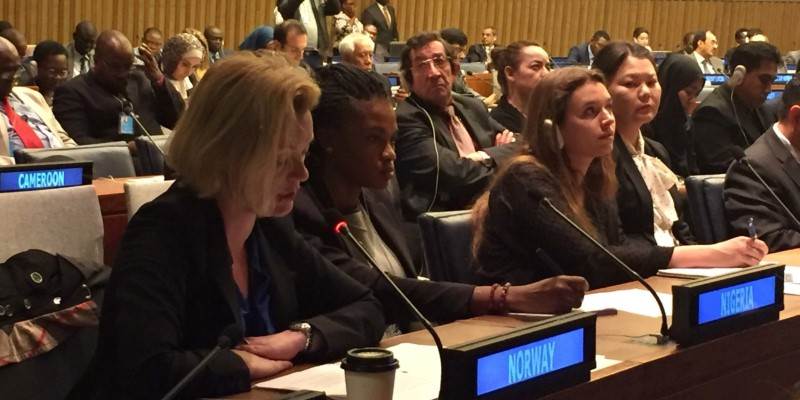Chair,
The reports before us demonstrate how relevant the Program of Action from the 1994 International Conference on Population and Development (ICPD) and the outcome documents of its review conferences are for the achievement of the overarching objective of our new agenda: poverty eradication through sustainable development, with human rights and gender equality at its core.
Girls and women are our best agents of change. If they are to play their full role, they must have access to quality education at all levels and to sexual and reproductive health services, modern methods of contraception, safe abortion and comprehensive sexuality education. Their right to decide on matters related to their sexuality free of coercion, discrimination and violence must be guaranteed.
Civil society and youth have a key role to play in the implementation of the 2030 and the ICPD agendas. For this purpose, governments should create an enabling environment.
We are pleased that the principle of 'Leaving no-one behind' is weaved into the fabric of both reports, as a red thread. If we want to reach all, the demographic data to be collected must be disaggregated to include persons with disabilities, indigenous peoples and LGBTI persons.
Chair,
The 2030 Agenda has the potential to boost the achievement of the objectives, which were set in Cairo 22 years ago. Key elements of the Program of Action are reflected across the SDGs, notably through the targets on universal access to sexual and reproductive health and reproductive rights and to sexual and reproductive health care services. Also, the indicators recommended by the United Nations Statistical Commission should help sharpen our efforts and improve implementation of the ICPD commitments.
That being said, we should not foreclose the possibility of moving beyond the 1994 Agenda. Some countries might indeed want to set the bar higher than the SDGs or the indicators foresee. Some UN organizations are also ahead of the ICPD-commitments, based on decisions taken by their governing bodies.
Let me mention three examples on comprehensive sexuality education:
One: In UNESCO, the 195 Member States have agreed to include it in the current Program Budget, as a contribution towards healthy lifestyles and gender equality by empowering students to become responsible citizens.
Two: UNAIDS' strategy for the coming 5 years relies on comprehensive sexuality education as an important component in the fight against HIV/AIDS.
Three: UNFPA's strategy for 2014-2017 includes support to countries on comprehensive sexuality education. As a result, 63 countries have implemented comprehensive sexuality education in their curricula.
Another issue is sexual and reproductive health and rights, which is reflected in UNAIDS' strategy for 2016-21.
At the regional level, we also see that countries are moving ahead, taking on more ambitious commitments than in Cairo.
The 2014 Montevideo Consensus breaks new ground in relation to abortion and on the equal rights of all human beings, independent of their sexual orientation and gender identity. The Asian Pacific outcome document from their ICPD+20 review also go further than Cairo. In the same vein, we welcome the progress made with the AUs Maputo Protocol on African Women's rights.
We encourage the countries who have made commitments to go beyond the ICPD Program of Action and the SDGs to report to the High Level Political Forum on their efforts to achieve their ambitions. We ask the UN organizations concerned to provide relevant support to these countries in their endeavors.
Thank you.
